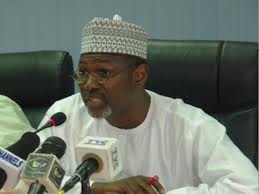As the events leading to Nigeria’s 2015 elections gradually unfold, the governors of the All Progressives Congress (APC) have criticised the election timetable recently released by INEC, stating that it was induced by the presidency.
In his response to this criticism, the chairman of the Independent National Electoral Commission (INEC), Prof. Attahiru Jega, declared that the timetable announced by the commission was informed by rational and logical considerations, not sentimental or ulterior motivations.

INEC in a statement signed by the Chief Press Secretary to INEC Chairman, Mr. Kayode Idowu, stated that the commission was mindful of its own operations and in the interest of worldwide best practices has decided to conduct the national and state elections on different days: the national elections coming first.
INEC announced two week ago, the timetable for the National Assembly and Presidential elections for February 14, 2015, and Governorship as well as State Assembly elections for February 28, 2015.
Jega, while fielding questions from the audience after a presentation at Chatham House, London, at the weekend, countered the claims of the APC that the election timetable released by the commission is a product of pressures coming from the presidency.
Jega said, “Nobody has put us under any pressure. We did these things logically and rationally, in terms of what we considered best for our country. As far as we are concerned, the presidential election is not positioned first. What we did is that we combined the National elections, so you can’t say that presidential election is placed first.”
He went ahead to explain, “Some Nigerians wonder why we can’t have all the elections in one day. It is true that in some countries, they conduct all their elections in one day. From our own assessment, the enormity of challenges associated with that is such that we are not prepared in the electoral commission to do all the elections in one day. But then, we felt that instead of having three elections, let us have two. In 2011, we had three: we did the National Assembly elections first; then, the Presidential; and then, the Governorship as well as State Assembly elections. But we felt that (in 2015), let us have two elections rather than three. Then we said: what is the best combination in line with global best practice? The global best practice is that you do national elections separate from state elections, if you can’t do all together.
“So, rather than have the presidential and governorship elections together, or the National Assembly with State Assembly elections; we said, let us have all the national elections together, and then the state elections.
“That is the logic, that is the rationale; and it is defensible. But you hear politicians make all manners of allegations; because in their own calculation, some people want certain elections to come first, others want it to come later. If you do not satisfy what they want, then they would start accusing you as if there is an interest being served, or that we came under some pressure. Nobody has put us under any pressure.”
While commenting on the logistics challenge that was experienced in the Anambra gubernatorial elections, he said, “The issue of logistics is a major challenge for INEC, and we are doing our best to address it. But for Anambra, the state has 31 local government areas, and the challenge we faced was with regard to one local government – Idemili North. Since the Edo State governorship election, we started customising result sheets to specific wards and polling units. In the past, politicians would get result sheets and move them around. So, we started customising the result sheets. And so, if there was a mix-up in the distribution among polling units, you would have the kind of crisis we had in Anambra. Of course, there was no reason why there should be that kind of mix-up, and we were not satisfied by the explanation given by the Electoral Officer in charge of that local government. But the fact was that before we could retrieve and redistribute those result sheets, time had lapsed and the people had become agitated. Some even blocked our officials from proceeding with the process of redistribution, because they suspected that something funny was happening.
“What we have done is to have that officer arraigned in court. He has been charged, because it is a criminal offence to obstruct the electoral process or undermine elections. The matter is in court, and is being prosecuted. So, we are doing our best. You cannot stop people from interpreting what happened one way or the other, especially as it is true that Idemili is an area considered a stronghold of one of the candidates. Was it done deliberately? That is what the court case will be addressing. But we cannot allow this to continue to happen. And that is why we are paying a lot of attention to addressing the challenge. We have demonstrated a capacity to identify people who are responsible for failures, and to hold them accountable. And that is another thing that wasn’t the case in the past. It is a big challenge and we will continue to do our best in that regard.”
Source: http://www.thisdaylive.com/articles/inec-defends-2015-election-timetable/170419
“